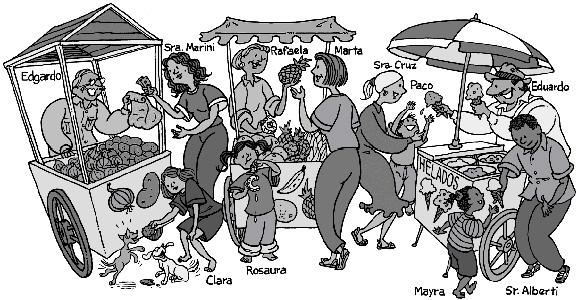VOCABULARIO. Match each word or expression on the left with the appropriate description on the right.
 figure 1.png)
1.?d?
2.?e?
3.?f?
4.?b?
5.?c?
6.?a
You might also like to view...
En el mercado. Todos los vecinos de la calle Juárez van de compras los sábados. Contesta las preguntas a continuación sobre lo que pasa en el dibujo. Debes usar dos (2) complementos pronominales -un complemento indirecto y un complemento directo- en tus respuestas.  ¿Quién le da helado a Mayra? El Sr. Alberti ____________________ ____________________ da.
¿Quién le da helado a Mayra? El Sr. Alberti ____________________ ____________________ da.
Fill in the blank(s) with the appropriate word(s).
Complete the following sentences, using the present indicative of the Spanish equivalent of the verbs provided.
¿Tú ________________ (have lunch) en la cafetería?
During the lecture, our professor used a vignette to introduce the thesis for the hour
A) software B) camera C) illustration D) textbook
PART A: How do the benefits of television compare to reading literature?
a. Television engages students more directly, while reading literature helps develop students' imaginations. b. Television more quickly develops students' mental processes, while reading literature teaches students patience and hard work. c. Television teaches students more modern and relevant storylines, while reading literature allows students to better understand the past. d. Television can expose students to different types of stories and cultures, while reading literature develops their mental processes.